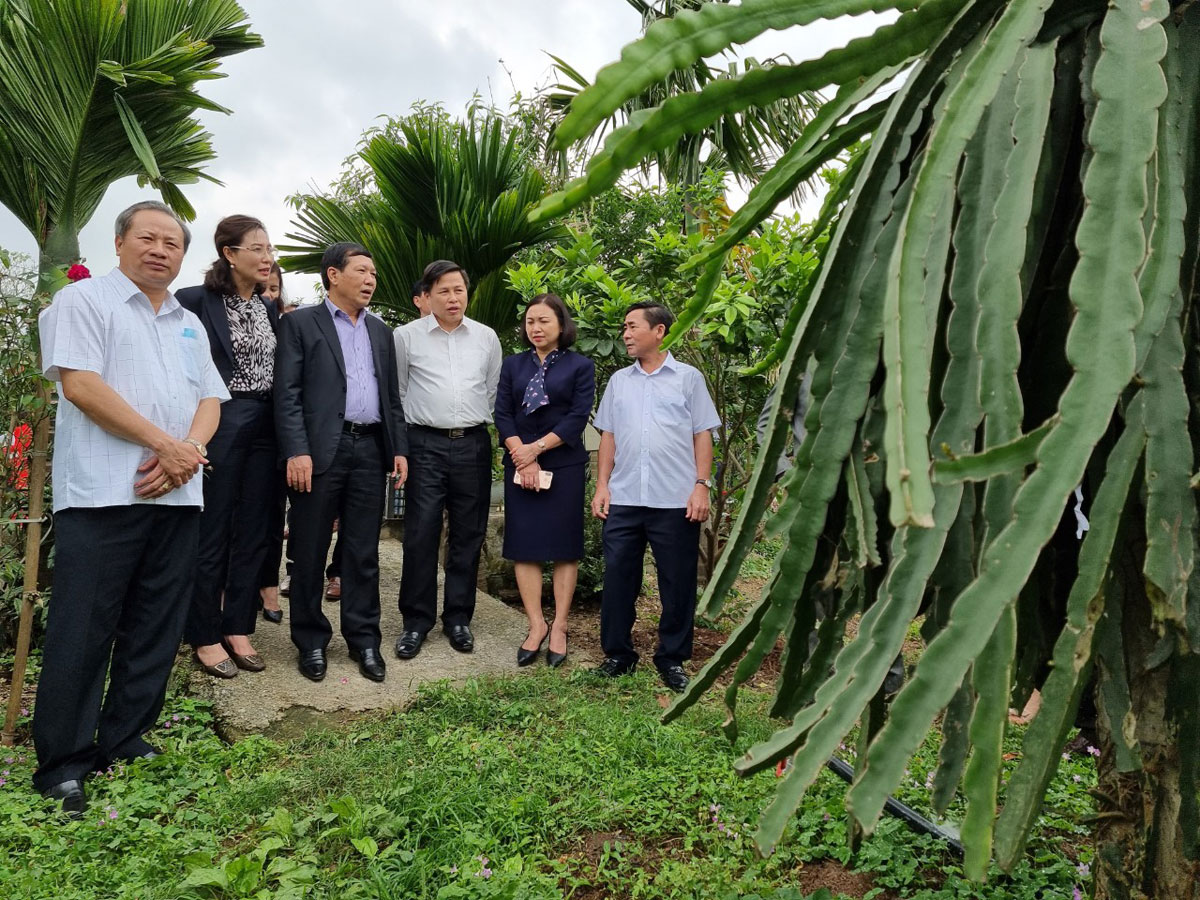
(HBO) – A working delegation led by Director and Chief of the Central Coordination Office on New Rural Development Nguyen Minh Tien made a trip to Lac Thuy district to inspect its performance in meeting criteria to be recognised as a new-style rural area for 2020. Attending a working session with the delegation were Vice Chairman of the provincial People’s Committee Dinh Cong Su and officials of Lac Thuy as well as local departments and agencies.

The
delegation and provincial and district officials inspect a model garden in Doi
village, Ba Hang Doi township.
After a decade of
implementing the new-style rural area building programme, all eight communes in
the district were recognised as new-style rural areas, meeting all nine
criteria for the status in accordance with the Prime Minister’s Decision
No.558/QD-TTg dated April 5, 2016.
So far, Lac Thuy
district has undergone a major face lift with fair economic growth and higher
local income. Relic sites and fine cultural traditions have been maintained
while the quality of education, health care and the environment has improved.
Public security and social order has been ensured, giving local residents
better material and spiritual lives.
During the 2011-2020 period, Lac Thuy had amassed over 7.765 trillion VND for
new rural area development, over 175.7 billion VND of which was from the State
budget, more than 678.2 billion VND from local budget, over 1.77 trillion VND
from related programmes and projects, over 3.96 trillion VND from credit, more
than 355 billion VND from businesses and 814.5 billion VND from the public. The
district recorded no debt for basic construction in the effort. Capital was
allocated to projects in line with regulations.
The delegation inspected nearly 20 residential areas, production models in
value chains, production-trade facilities, One Commune, One Product products,
infrastructure in communes, and reviewed the district’s dossier seeking new
rural-style area status. They spoke highly of the district's achievements,
which demonstrated local authorities’ attention and consensus of local
residents in the regard.
Notably, the
income in the district was higher and the rate of poor households was lower
compared to the average figures in the northern mountainous region. The
district is home to many outstanding and high-value agricultural production
models.
The delegate assessed that the district’s report had basically provided
sufficient information and data as requested, but asked the district to add
comparison between current data and those at the starting point to make it
achievements more outstanding. About resource mobilisation, the district was
required to review public involvement and pay attention to improving housing,
environment quality and rural landscape.
Based on inspection results, the delegation reached consensus in allowing the
district to finalise the dossier to submit to the central verification council
for consideration./.
Hoa Binh province is undergoing a dynamic transformation amid Vietnam’s national digital transition. Building on Poliburo’s Resolution No. 57-NQ/TW on breakthroughs in science, technology, innovation, and national digital transformation, the province has rolled out a wide range of practical action plans. A standout initiative is the "Digital Literacy for All” movement, an effort to ensure that no one is left behind in the digital era.
Hoa Binh province is undergoing a dynamic transformation in the wake of the national digital transformation movement. Building on Resolution No. 57-NQ/TW of the Politburo on breakthroughs in science, technology, innovation, and national digital transformation, the province has implemented a wide range of practical action plans. A standout initiative is the "Digital Literacy for All” movement ambitious effort to ensure that no one is left behind in the digital age.
With a spirit of unity and proactive problem-solving, the Party Committee, the government and the people of Dong Lai Commune (Tan Lac District) have made great strides in implementing the resolutions of the 24th Party Congress of the commune for the 2020 - 2025 term. Focusing on leadership and practical actions, the commune has brought the Party’s resolutions into daily life, creating strong impacts and pushing the local development forward.
Amid the nationwide push for digital transformation, young people in Hoa Binh Province are stepping up as dynamic pioneers, applying technology to enhance Youth Union operations and expand the reach of youth-led initiatives. Through creativity and adaptability, Youth Union organizations at all levels have introduced a series of practical solutions, contributing to modern governance and community development.
In recent years, An Nghia commune, located in Lac Son district, has stepped up administrative reform, focusing on improving the quality and efficiency of its single-window service unit for receiving and processing administrative procedures. These improvements have helped create favourable conditions for local residents and organisations to handle administrative procedures, contributing to the commune’s broader socio-economic development.
The Prime Minister-approved master plan to develop the multi-use value of forests ecosystems through 2030, with a vision to 2050, aims to improve the management and sustainable use of forest resources, create jobs, increase incomes, and improve the living standards of ethnic minorities, people in mountainous and remote areas, forest workers and those living near forests.



